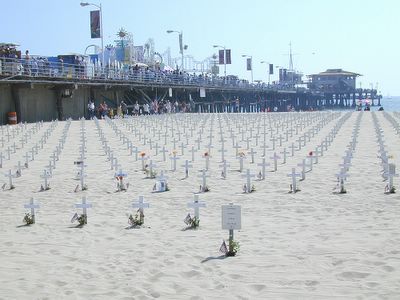In former Treasury Secretary Paul O'Neill's book The Price of Loyalty, it says getting rid of Saddam was at the top ofAnd even those revelations are trumped by Houston Chronicle columnist Mickey Herskowitz's statement in a 27 October 2004 interview on GNN.tv: "He was thinking about invading Iraq in 1999."President Bush's agenda in his very first cabinet meeting back in January 2001; Counter Terrorism Czar Richard Clarke wrote that President Bush pressured him to come up with evidence linking 9/11 to Iraq; Bob Woodward, in his book Plan of Attack, reported the administration was determined to invade Iraq long before the president went to the United Nations in September 2002.
Of course the story of the outing of Valerie Plame as a CIA officer has eclipsed the Downing Street Memo story because of Karl Rove's superstar status. In quick searches on CNN.com and MSNBC.com, Shuster's article mentioned above—from three weeks ago—was the most recent DSM story on either website.
However, this reduction in priority of a story that was already low-priority doesn't indicate its unimportance. The story is a quietly significant piece of information that will still be there when the smoke and strobe lights of the Rove story wind down and Rove returns to his job with even greater influence over policy-making.
Perhaps a more effective way to gain a higher profile for the Downing Street Memo would be to concatenate it with all the revelations that preceded it, starting with Herskowitz's interview of candidate Bush in 1999, and to give that catena of revelations a unifying name. "The Backstory." "Early Dissembling." "The AMUHM (Already Made Up His Mind) Evidence." Something like that.
If the DSM isn't "the smoking gun," then it certainly is the barrel or the trigger guard or some other part of the smoking gun composed of all the revelations collectively.
 It's not the crime, it's the cover-up? The outing of Plame was obviously part of the cover-up. But so was the State of the Union Address in 2003 in which Bush knowingly included faulty intelligence. And Bush and Rumsfeld stating in May 2002, as reported on NPR, that they had no plans to invade Iraq was also part of the cover-up. I wonder how many other pieces could be assembled.
It's not the crime, it's the cover-up? The outing of Plame was obviously part of the cover-up. But so was the State of the Union Address in 2003 in which Bush knowingly included faulty intelligence. And Bush and Rumsfeld stating in May 2002, as reported on NPR, that they had no plans to invade Iraq was also part of the cover-up. I wonder how many other pieces could be assembled.If this story were about the Bush administration awarding fat "pork" contracts to some construction buddies in Texas, it would be annoying but understandable if the story got lost under a pile of other stories. But the result of the actual deception and cover-up is so much more serious than that. As of today, 1,946 coalition military personnel have been killed in the war in Iraq, and the disputed number of civilian deaths is a multiple of that.
Because of the death toll resulting from the deception leading up to the invasion of Iraq (and only in subsequent cases resulting in a high death toll), "high crimes and misdemeanors" should be very loosely interpreted.


2 comments:
Hey Don, tell us about the pictures. (Well, nos. 1 and 3, anyway...)
I just Photoshopped the first image. (What are the odds that at least one egg has been tossed since the invasion of Iraq? I think pretty good. Of course, the ride would've been shut down immediately and everyone escorted out.)
The third picture is from a walk on the beach in Santa Monica in 2004. We didn't know about the Arlington West Memorial Project beforehand and were really impressed with its eloquence when we came across it. (The picture links to a site with more info.)
Post a Comment